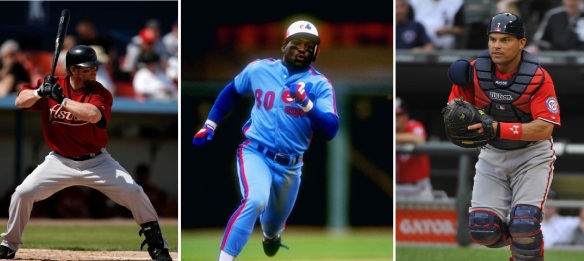After seeing two all-time great players, in Ken Griffey Jr. and Mike Piazza, obtain the necessary 75 percent of the vote to receive enshrinement into the Hall of Fame last January, the baseball world has been abuzz for the past year as to who would be elected in 2017. With a ballot loaded with several great returning players as well as numerous first time players, everyone around the baseball world had their own strong opinion as to who they felt should be in.
But the waiting and speculation finally came to an end on Wednesday evening, when it was announced that Jeff Bagwell, Tim Raines and Ivan Rodriguez had received more than enough votes to join Bud Selig and John Schuerholz (both elected in December) as part of the 2017 Baseball Hall of Fame class set to be inducted in July.

Jeff Bagwell received 381 of the 442 votes cast, giving him 86.2 percent of the vote and earning him induction into the Hall. With 449 career home runs and 2,314 hits, Bagwell doesn’t jump off the page in quite the manner that a lot of other players do, but he is still very deserving. It took him longer than many thought it would to get into the Hall, but I’m sure he would be the first to tell you that getting in is all that counts in the end.
Joining Bagwell was Tim Raines, who placed second in voting with 86 percent of the vote. Despite not having a lot to show for his career in the power category, Raines was exceptional over his 23 years in a number of other categories. Sitting fifth all-time in stolen bases with 808 to go along with 2,605 hits and a .294 lifetime average, Raines was more than worthy of being elected in his final year of eligibility on the ballot.
On the flip side, Ivan Rodriguez was awarded induction in his first time on the ballot, becoming just the second catcher ever (Johnny Bench was the first) to be elected their first year. Rodriguez set numerous catching records over his career, and was a solid hitter as well, taking part in fourteen total All-Star games. Despite being clouded by the suspicion of PED’s, Rodriguez finds himself headed to Cooperstown.
But while this was the fourth straight year with two or more players being elected to the Hall of Fame, some players fell just short. Trevor Hoffman came one percent shy of the necessary three-quarters of voters’ support needed, with Vladimir Guerrero (who many felt was a first-ballot Hall of Famer) getting 71.7 percent. However, although they didn’t make it this time around, confidence is high for both of them to get in next year.
The two most controversial players on the ballot for the last several years, Barry Bonds and Rogers Clemens both fell below the 55 percent mark, failing to get in once again despite having first-ballot Hall of Fame stats aside from their PED use. But while it was once thought that neither would ever get in, they are both making steady progression up the percentage ladder, and very well could slip in before all is said and done.
Regardless of if Bonds and Clemens ever get in, sixteen players from this year’s ballot are guaranteed to never get into the Hall. With Lee Smith running out of eligibility years and players such as Jorge Posada and Tim Wakefield not securing the needed five percent to stay on the ballot, those players will forever be known as simply great — but not all-time great — players.
The results of the 2017 Hall of Fame election certainly proved that the voting tide is slowly beginning to shift. As more and more players are shoveled into the Hall of Fame at record rates, only time will tell how the next few years will see the Hall of Fame grow.
It’ll be interesting to see which players make it into the Hall of Fame in 2018.


